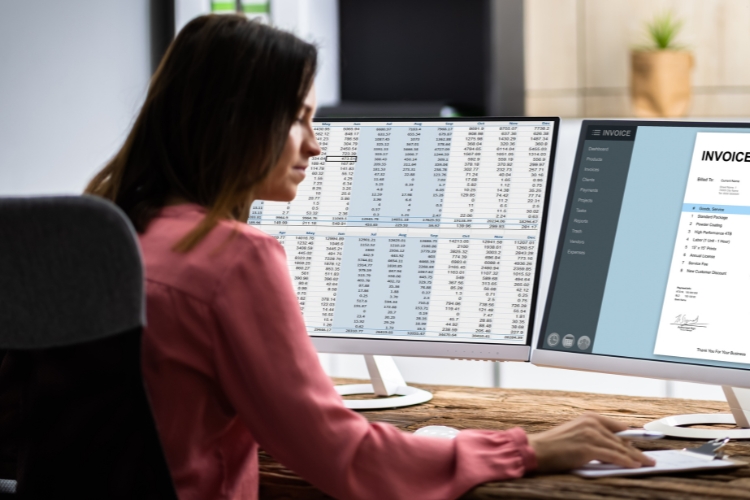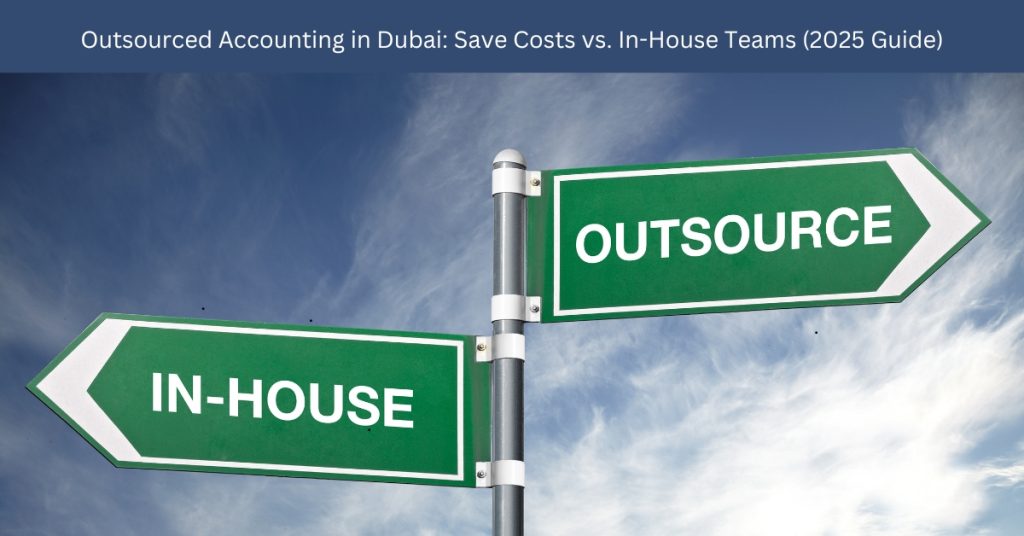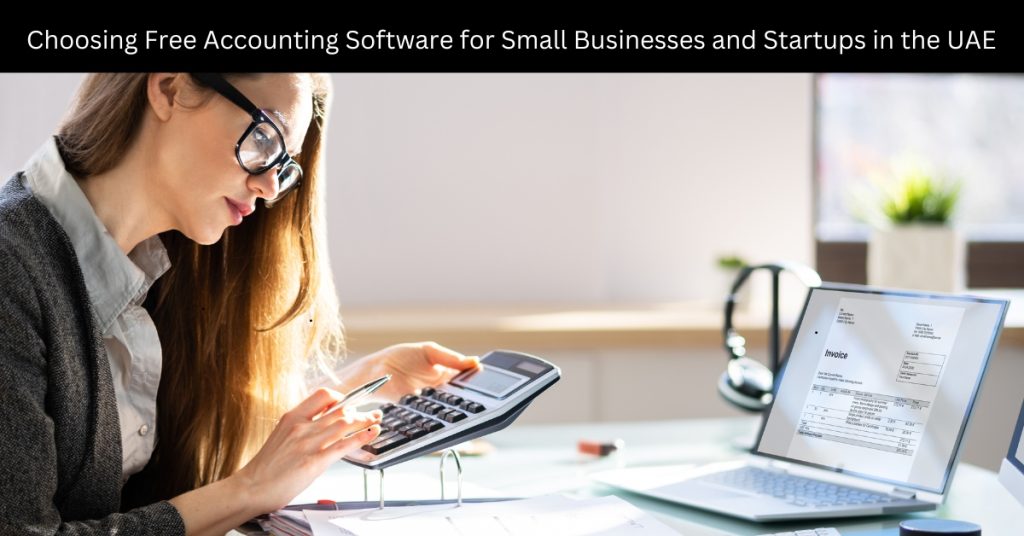As the UAE continues to evolve its financial regulations with the introduction of corporate tax and strict VAT compliance requirements, businesses must transition to advanced accounting software solutions to stay compliant and competitive.
This blog article provides a detailed comparison of the top accounting software platforms available in 2025, analyzing their features, pricing, compliance capabilities, and suitability for different business sizes.
From freelancers to large enterprises, the article helps UAE-based businesses make informed decisions when choosing an accounting solution that meets both operational and regulatory needs.
Key Takeaways
| Category | Key Insights |
|---|---|
| Top Picks for SMEs | Zoho Books, QuickBooks Online, and Xero offer strong features and VAT compliance. |
| Best for Enterprises | Microsoft Dynamics, Oracle NetSuite, and SAP S/4HANA suit complex operations. |
| Budget-Friendly Options | Wave (free) and FreshBooks are ideal for freelancers and small service providers. |
| Regulatory Compliance | Ensure FTA-approved VAT filing, corporate tax modules, and e-invoicing capability. |
| Cloud vs On-Premise | Cloud software offers accessibility and automatic updates; on-premise offers more control. |
| Must-Have Features | Multi-currency, real-time bank feeds, mobile access, and inventory management. |
| Implementation Tips | Conduct trials, clean financial data, verify compliance, and train your team thoroughly. |
| Technology Trends | AI, blockchain, and RegTech are shaping the future of accounting in the UAE. |
The Imperative for Advanced Accounting Solutions in the UAE
1. Compliance with Evolving Tax Regulations
The UAE’s tax landscape has undergone significant changes, necessitating businesses to adopt accounting software that ensures:
-
VAT Compliance: Automated VAT calculations and FTA-approved reporting to avoid penalties exceeding AED 50,000 per violation.
-
Corporate Tax Readiness: Integration of corporate tax modules to prepare for the 2025 implementation.
-
E-Invoicing Capabilities: Compliance with upcoming e-invoicing mandates to streamline transactions and reporting.
2. Enhancing Operational Efficiency
Modern accounting software offers features that significantly improve business operations:
-
Automated Processes: Reduction in manual data entry, minimizing errors and saving time.
-
Real-Time Financial Insights: Immediate access to financial data for informed decision-making.
-
Cloud Accessibility: Secure, remote access to financial information, facilitating flexibility and mobility.

Criteria for Selecting Accounting Software in the UAE
When evaluating accounting software, businesses should consider the following key factors:
1. Regulatory Compliance
Ensure the software is:
-
FTA-Approved: Capable of generating VAT reports in the required format.
-
E-Invoicing Ready: Equipped to handle electronic invoicing as per UAE mandates.
-
Corporate Tax Modules: Includes features to manage corporate tax calculations and reporting.
2. Business Size and Industry Fit
Select software that aligns with your business’s scale and sector:
| Business Type | Employee Count | Recommended Solutions |
|---|---|---|
| Freelancers/Sole Proprietors | 1 | Wave, FreshBooks |
| Startups | 2–10 | Zoho Books, QuickBooks Online |
| Growing SMEs | 11–50 | Xero, TallyPrime |
| Large Enterprises | 50+ | SAP, Oracle NetSuite, Dynamics 365 |
3. Essential Features
Look for software that offers:
-
Automated Tax Calculations: Real-time VAT and corporate tax computations.
-
Bank Reconciliation: Direct integration with UAE banks for accurate financial tracking.
-
Multi-Currency Support: Essential for businesses dealing with international transactions.
-
Inventory Management: Particularly important for product-based companies.
-
Mobile Accessibility: Cloud-based access to financial data from any location.
Leading Accounting Software Solutions in the UAE
1. Zoho Books
Overview: Zoho Books is a cloud-based accounting solution tailored for SMEs, offering comprehensive features at an affordable price point.
Key Features:
-
FTA-approved VAT filing.
-
Arabic language interface.
-
Integration with UAE banks.
-
Automated workflows and invoicing.
-
Multi-currency support.
Pricing:
-
Standard: AED 99/month
-
Professional: AED 199/month
-
Premium: AED 299/month
Ideal For: SMEs seeking a cost-effective, compliant, and scalable accounting solution.
2. QuickBooks Online
Overview: QuickBooks Online is renowned for its user-friendly interface and robust feature set, catering to businesses of various sizes.
Key Features:
-
Automated invoicing and expense tracking.
-
VAT-ready with tax reporting features.
-
Integration with payment gateways and banks.
-
Real-time financial dashboards.
Pricing: Starts from AED 60/month
Ideal For: Startups and small businesses requiring an intuitive and efficient accounting platform.

3. Xero
Overview: Xero offers a cloud-based accounting solution with a focus on collaboration and scalability, suitable for growing businesses.
Key Features:
-
Real-time cash flow monitoring.
-
Automated VAT tax filing compliant with UAE regulations.
-
Multi-currency transactions.
-
Integration with over 800 third-party apps.
Pricing: Starts from AED 120/month
Ideal For: SMEs looking for a scalable solution with strong collaboration features.
4. TallyPrime
Overview: TallyPrime is a desktop-based accounting software known for its reliability and comprehensive features.
Key Features:
-
VAT-compliant with tax filing capabilities.
-
Detailed financial reporting.
-
Inventory management integrated with accounting.
-
Multi-user access for teams.
Pricing: One-time license fee starting from AED 1,800
Ideal For: Businesses preferring an on-premise solution with extensive reporting and inventory tracking features.
5. Microsoft Dynamics 365
Overview: Microsoft Dynamics 365 is an enterprise-grade ERP solution offering advanced financial analytics and global compliance features.
Key Features:
-
AI-powered insights and forecasting.
-
Seamless ERP integration.
-
Customizable reporting and analytics.
Implementation Cost: Typically AED 50,000+
Ideal For: Large enterprises with complex, multinational operations.
6. Sage 50cloud
Overview: Sage 50cloud combines desktop software with cloud functionality, offering advanced features for SMEs.
Key Features:
-
Inventory management.
-
Cash flow forecasting.
-
VAT-compliant reporting tools.
Pricing: Starts from AED 70/month
Ideal For: SMEs requiring advanced analytics and cloud-based automation.

7. Wave Accounting
Overview: Wave is a free cloud-based accounting solution, best suited for freelancers and small businesses.
Key Features:
-
Free invoicing and expense tracking.
-
Automated bank reconciliation.
-
Customizable reporting.
Pricing: Free (with optional paid add-ons)
Ideal For: Freelancers and startups seeking a budget-friendly bookkeeping solution.
8. FreshBooks
Overview: FreshBooks is designed for service-based businesses, offering intuitive invoicing and time-tracking features.
Key Features:
-
Time tracking and client management.
-
Customizable invoices.
-
Expense tracking.
Pricing: Plans start at AED 69/month
Ideal For: Service-based SMEs requiring efficient invoicing and project management tools.
9. Oracle NetSuite
Overview: Oracle NetSuite is a cloud-based ERP system offering scalability and advanced customization, ideal for global operations.
Key Features:
-
End-to-end business management.
-
Real-time dashboards.
-
Full customization.
Ideal For: Corporations managing multi-location and multi-country accounts.
10. SAP S/4HANA
Overview: SAP S/4HANA provides industry-specific solutions with robust features for core business functions.
Key Features:
-
Product planning and human resource management.
-
Core financial functions.
-
Enhanced user experience with SAP S4 Hana.
Ideal For: Large corporations with international supply chains and multiple departments.

Emerging Trends in Accounting Technology for 2025
1. Artificial Intelligence and Machine Learning
-
Intelligent invoice processing.
-
Predictive cash flow analysis.
-
Automated fraud detection.
2. Blockchain Integration
-
Immutable transaction records.
-
Smart contract capabilities.
-
Enhanced audit trails.
3. Regulatory Technology (RegTech)
-
Auto-updating tax rules.
-
Real-time compliance alerts.
-
Automated FTA reporting.
Implementation Guide: Steps to Success
-
Assess Your Business Requirements: Identify essential features, current pain points, and set realistic budget parameters.
-
Test Potential Solutions: Utilize free trials to compare user interfaces, mobile functionality, and reporting capabilities.
-
Verify Compliance Features: Confirm FTA approval status, test VAT calculation accuracy, and verify e-invoicing capability.
-
Plan Data Migration Carefully: Clean existing financial data, schedule transitions during off-peak times, and maintain complete backups.
-
Train Your Team Thoroughly: Schedule vendor training sessions, create detailed procedure manuals, and designate internal super-users.

Cost-Benefit Analysis: Understanding the ROI
1. Efficiency Gains
-
65-80% faster invoicing processes.
-
70-90% reduction in manual data entry.
-
50-75% fewer compliance errors.
-
40-60% faster month-end closing.
2. Payback Period Expectations
-
Small businesses: 3-6 months.
-
Medium businesses: 6-9 months.
-
Large enterprises: 9-12 months.
Conclusion: Making the Right Choice for Your Business
Selecting the ideal accounting software requires careful consideration of your current business size and type, compliance requirements, growth plans, and technical capabilities. Our final recommendations are:
-
Freelancers/Sole Proprietors: Wave or FreshBooks.
-
Startups: QuickBooks Online.
-
Growing SMEs: Zoho Books or Xero.
-
Product-Based Businesses: TallyPrime.
-
Large Enterprises: Microsoft Dynamics or SAP.
Remember that the right accounting solution should not only meet your current needs but also scale with your business while ensuring full compliance with the UAE’s dynamic regulatory environment. Many providers offer free trials; it is advisable to test 2-3 options before making your final decision.
Frequently Asked Questions
Which software is best for VAT compliance?
Zoho Books and TallyPrime offer comprehensive FTA integration, including direct submission capabilities.
Can I use free accounting software in the UAE?
Yes, but solutions like Wave lack VAT features and are only suitable for non-VAT registered businesses or very basic needs.
How much does accounting software cost in the UAE?
Pricing ranges from free (Wave) to AED 60-300/month for SME solutions, and AED 500+/month for enterprise systems, with custom pricing for large implementations.
Should I choose cloud or on-premise software?
Cloud solutions offer better accessibility and automatic updates, while on-premise (like Tally) provides more control for businesses with security concerns.



